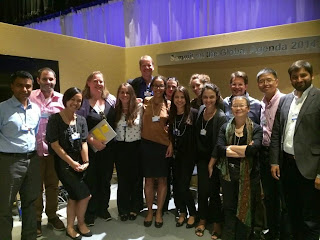Faculty Research Fellow Farida Vis has just come back from Dubai where she attended the World Economic Forum’s Summit on the Global Agenda. The summit offers an opportunity for members of the Global Agenda Councils to meet in person and discuss the most pressing issues identified within their council and connect these to wider global concerns. All councils started their new two-year terms this September:
The Global Agenda Councils make up the world’s largest volunteer network of experts. Every two years the network brings together leaders, pioneers and experts from business, government, international organizations, academia and civil society to provide innovative thinking on critical global issues and incubate projects, events and campaigns for the public good. In the 2014-2016 term, experts will be grouped into 86 councils, each addressing a specific issue. A full list of councils can be found here.
Farida serves (for a second term) on the Global Agenda Council on Social Media, which has 21 members from all over the world. The council is chaired by Emily Bell, Professor of Professional Practice and Director of the Tow Center for Digital Journalism at
Columbia University. Together council members will continue to explore social media’s potential by developing a set of standards and metrics to better analyse the impact on society. The council will convene leaders to present them with actionable research and recommendations developed by social media experts, with the long-term aim of harnessing social media for good.
The Dubai summit also officially launched the ‘Outlook on the Global Agenda’, which identifies the top 10 trends for the world in 2015. This blog post by Al Gore provides a useful summary of the key global challenges identified for the next 12-18 months.
Members of the Global Agenda Council on Social Media have identified a number of areas that council members will work on. These include issues around best practices and use of social media for different stakeholders, user generated content (UGC) and the verification of social media data, most notably images, concerns over ethics and privacy, civic participation through social media, international use of social media, and algorithmic accountability.
Farida will lead a project on UGC, verification and ethics and will collaborate with four other council members, including Emily Bell. The group is planning to organise a first event at the Tow Center for Digital Journalism in New York next summer.

Comments